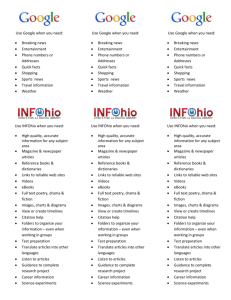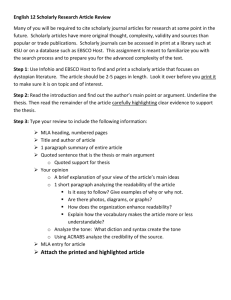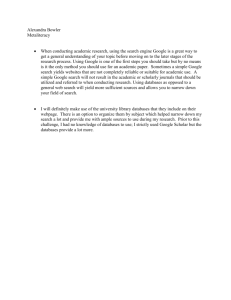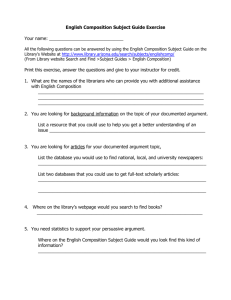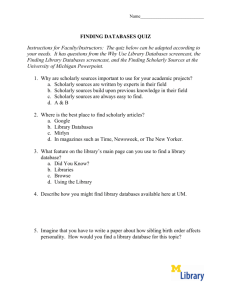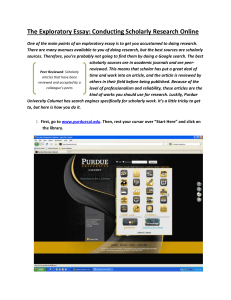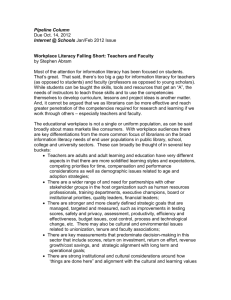Research Databases: INFOhio
advertisement
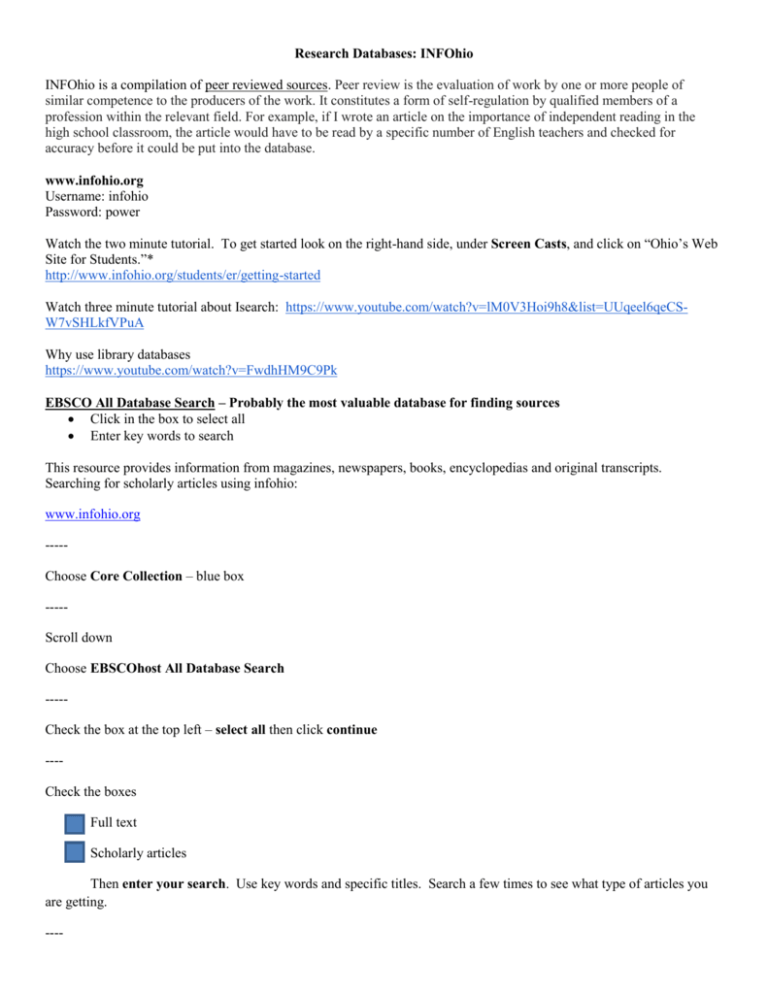
Research Databases: INFOhio INFOhio is a compilation of peer reviewed sources. Peer review is the evaluation of work by one or more people of similar competence to the producers of the work. It constitutes a form of self-regulation by qualified members of a profession within the relevant field. For example, if I wrote an article on the importance of independent reading in the high school classroom, the article would have to be read by a specific number of English teachers and checked for accuracy before it could be put into the database. www.infohio.org Username: infohio Password: power Watch the two minute tutorial. To get started look on the right-hand side, under Screen Casts, and click on “Ohio’s Web Site for Students.”* http://www.infohio.org/students/er/getting-started Watch three minute tutorial about Isearch: https://www.youtube.com/watch?v=lM0V3Hoi9h8&list=UUqeel6qeCSW7vSHLkfVPuA Why use library databases https://www.youtube.com/watch?v=FwdhHM9C9Pk EBSCO All Database Search – Probably the most valuable database for finding sources Click in the box to select all Enter key words to search This resource provides information from magazines, newspapers, books, encyclopedias and original transcripts. Searching for scholarly articles using infohio: www.infohio.org ----Choose Core Collection – blue box ----Scroll down Choose EBSCOhost All Database Search ----Check the box at the top left – select all then click continue ---Check the boxes Full text Scholarly articles Then enter your search. Use key words and specific titles. Search a few times to see what type of articles you are getting. ---- Read the abstract (brief summary of the article) to see if it is interesting or will help you write your paper. Click PDF at the bottom of the abstract to see or print the article. When printing, hover over the bottom right corner of the screen and icons will appear, choose the printer and it will take you to the print menu. Choose double sided to save paper. *Note: Many of these articles are long; be sure to choose an article that you are willing to read for the assignment. This may require looking at a few before you decide to print. Find and article that relates to the time period or topic of your self-select books! Points of View Reference Center Presents articles supporting multiple sides of current issues. World Book's Academic Edition Comprehensive reference tool that includes encyclopedia, multimedia, e-book, and primary source databases, fully integrated in a single search. ***Check the list of databases – there may be others that help you based on your topic. For example, there are specific databases for health articles and for science research. How do I know I am doing scholarly research? Watch the following short videos: Using Wikipedia for Academic Research https://www.youtube.com/watch?v=gpDxV73y-hg&feature=youtu.be Scholarly Resources https://www.youtube.com/watch?v=CIp5dIsr-go Scholarly vs Popular Articles http://helios.weber.edu/helioschapters/audio/16/story.html How do I really use Google? Below are crucial search tips for obtaining optimum information from Google. The goal is to get the most important and accurate information in the least number of hits. 1. Use quotation marks to look for words in the exact order that you enter them. “American Revolution” “human rights” 2. Use a minus sign to exclude a word from your search. (Note: there must be a space between the first word and the minus sign) Vikings -Minnesota Depression -great 3. To limit websites by certain groups, such as colleges and universities or organizations, use the site operator site:edu site:org site:gov For example: If a student is researching information about lacrosse and she only wants results from educational institutions, she would type lacrosse site:edu in the search bar 4. To find specific words in a title of the webpage use the word intitle and a colon prior to the topic intitle:Aurora Helpful hints: Do not ask questions in the search bar The most effective word searches consist of typing in carefully chosen words and excluding those that are irrelevant – articles (a, an, the) Source Analysis Remember to analyze each source according to the ACRAB method that we have used in class this year. There MUST be an ACRAB justification for every research source. A: Authority – Can this person be considered an authority on the subject? How do you know this person is an authority? C: Currency – Is this information source the most current? R: Relevance – Does this source specifically align to the research question? A: Accuracy – Can you tell this is accurate information? Does the source itself provide a bibliography? B: Bias – Does the information seem one sided and fair? Is the information objective? Name: _________________________ INFOhio Homework 1. Where are the Quick Links located in INFOhio? Located at the _______________ of __________ page. 2. Is INFOhio mobile friendly? _____ What does this mean? 3. To log-in from home, what is needed? 4. What is an advantage to ISearch? 5. Explain the difference between Basic and Advanced resources in ISearch. 6. Basic is for ____________________________________________________________________ 7. Advanced is for ________________________________________________________________ 8. What MLA information is included in all INFOhio sources? ____________________. 9. Why is it advantageous to use a library data base instead of Google? You get recent ____________ ____________________ that will ______________ your __________________! 10. What is another advantage to using a library data base instead of Google? 11-13. List three ways one can tell if the work is scholarly and authoritative? 1. 2. 3. 14-17. Why aren’t Google and Wikipedia ideal for doing scholarly research? 1. 2. 3. 4. 18. How can Google and Wikipedia be useful? 19. Characteristics of Popular Articles Written for the _______________ ________________ Written by a _________________ or __________________ Contain extensive ________________, _______________, and ________________ Published __________, _____________, or _______________ Rarely include ________________ or _____________________ 20. Characteristics of Scholarly Articles Written by someone who is an _______________ or has done ________________ on the _____________ Written for ___________________ Do not have many _______________, but may include ____________ and __________________ Often include _______________ and _____________________ information ___________________ or a ___________________ are usually included. 21. What is another name scholarly articles? ______________ _______________

